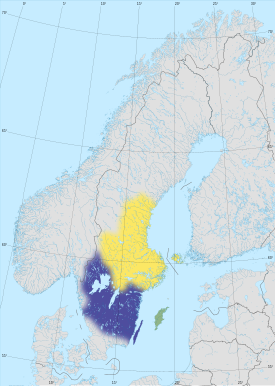
Back Svear Afrikaans Свеі Byelorussian Свэі BE-X-OLD Свеи Bulgarian Suions Catalan Свейсем CV Svear German Suiones Spanish Svealased Estonian Svealaiset Finnish

The Swedes (Swedish: svear; Old Norse: svíar; probably from the PIE reflexive pronominal root *s(w)e, "one's own [tribesmen/kinsmen]";[1][2] Old English: Swēon) were a North Germanic tribe who inhabited Svealand ("land of the Swedes") in central Sweden and one of the progenitor groups of modern Swedes, along with Geats and Gutes. They had their tribal centre in Gamla Uppsala.
The first author who wrote about the tribe is Tacitus, who in his Germania from 98 AD mentions the Suiones. They are possibly first mentioned locally by the Kylver Stone in the 4th century. Jordanes, in the 6th century, mentions Suehans and Suetidi. Beowulf mentions the Swedes around 1000 A.D. According to early sources such as the sagas, especially Heimskringla, the Swedes were a powerful tribe whose kings claimed descendence from the god Freyr. During the Viking Age they constituted the basis of the Varangian subset, the Norsemen that travelled eastwards (see Rus' people).
The scholarly consensus[3] is that the Rus' people originated in what is currently coastal eastern Sweden around the 8th century and that their name has the same origin as Roslagen in Sweden (with the older name being Roden).[4][5][6] According to the prevalent theory, the name Rus', like the Proto-Finnic name for Sweden (*Ruotsi), is derived from an Old Norse term for "the men who row" (rods-) as rowing was the main method of navigating the rivers of Eastern Europe, and that it could be linked to the Swedish coastal area of Roslagen (Rus-law) or Roden, as it was known in earlier times.[7][8] The name Rus' would then have the same origin as the Finnish and Estonian names for Sweden: Ruotsi and Rootsi.[8][9]
Swedes made up the bulk of the Varangian Guard, this can be seen from the geographical location of the Varangian Runestones, of which almost all are found entirely in modern-day Sweden. Swedish men left to enlist in the Byzantine Varangian Guard in such numbers that a medieval Swedish law, Västgötalagen, from Västergötland declared no one could inherit while staying in "Greece"—the then Scandinavian term for the Byzantine Empire—to stop the emigration,[10] especially as two other European courts simultaneously also recruited Scandinavians:[11] Kievan Rus' c. 980–1060 and London 1018–1066 (the Þingalið).[11]
- ^ "Pokorny. Indogermanisches Etymologisches Woerterbuch. 1959". Archived from the original on 13 June 2011. Retrieved 13 June 2011.
- ^ Bandle, Oskar. 2002. The Nordic languages: an international handbook of the history of the North Germanic languages. 2002. P.391
- ^ "The Vikings at home". HistoryExtra. Archived from the original on 4 May 2020. Retrieved 28 March 2020.
- ^ "Kievan Rus". World History Encyclopedia. Archived from the original on 14 April 2021. Retrieved 23 April 2021.
- ^ Sorabella, Jean. "The Vikings (780–1100) | The Metropolitan Museum of Art". The Met’s Heilbrunn Timeline of Art History. Archived from the original on 23 April 2020.
- ^ "Swedish Vikings and the Eastern World". Archived from the original on 28 March 2020. Retrieved 28 March 2020.
- ^ Blöndal, Sigfús (1978). The Varangians of Byzantium. Cambridge University Press. p. 1. ISBN 9780521035521. Archived from the original on 14 April 2023. Retrieved 2 February 2014.
- ^ a b Stefan Brink, 'Who were the Vikings?', in The Viking World Archived 14 April 2023 at the Wayback Machine, ed. by Stefan Brink and Neil Price (Abingdon: Routledge, 2008), pp. 4-10 (pp. 6–7).
- ^ "Russ, adj. and n." OED Online, Oxford University Press, June 2018, www.oed.com/view/Entry/169069. Accessed 25 July 2018.
- ^ Jansson 1980:22
- ^ a b Pritsak 1981:386
© MMXXIII Rich X Search. We shall prevail. All rights reserved. Rich X Search